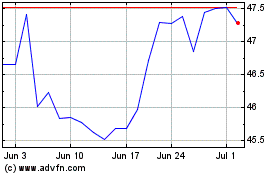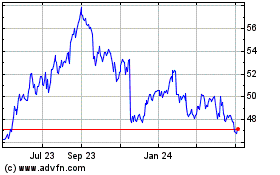Microsoft Wins Appeals Ruling on Data Searches
July 14 2016 - 12:40PM
Dow Jones News
Microsoft Corp. won a major legal battle with the Justice
Department Thursday when a federal appeals court ruled that a
warrant for a suspect's data doesn't extend to information stored
in computers overseas.
The case, closely watched by Silicon Valley firms, comes amid
broader tensions between Europe and the U.S. over government access
to data residing in the computers of social media firms and other
internet companies.
The Second U.S. Circuit Court of Appeals in Manhattan ruled that
federal law doesn't give investigators the ability to force
Microsoft to produce data stored on a server overseas. The case
arose from a 2013 warrant issued by a federal judge in New York for
the email contents of a suspect in a drug trafficking probe.
Some of that data happened to reside in Microsoft computers in
Ireland, and Microsoft fought the order in court, arguing that it
shouldn't be forced to comply with a U.S. court order demanding
data held in another country.
Other major firms—including Amazon.com Inc., Verizon
Communications Inc., and Cisco Systems Inc.--as well as lobbying
groups such as the U.S. Chamber of Commerce and the Software
Alliance, filed legal briefs supporting Microsoft.
The case is part of a broader fight between Silicon Valley and
Washington over how much authority the government has to force
technology companies to help them gather data in investigations.
The companies argued that revelations about U.S. spying with the
help of telecom companies have heightened foreign sensitivities and
placed U.S. firms at a competitive disadvantage abroad.
The Justice Department had argued that because Microsoft is
based in the U.S., the government has the authority to get the data
even if it is stored elsewhere, and asserted that there is no
conflict with Irish or European privacy laws.
In their legal briefs, Justice Department lawyers argued that a
Microsoft victory could lead some American customers to claim a
foreign country of residence "for the specific purpose of evading
the reach of U.S. law enforcement."
A Justice Department spokesman said the agency is disappointed
in the decision and reviewing its legal options. A Microsoft
spokeswoman declined to comment on the ruling, saying the company's
lawyers are still reviewing it.
In past cases, U.S. courts enforced subpoenas issued to banks
for business records held abroad, even when foreign law prohibited
it. The Second Circuit held in a 1984 ruling that control over
records, not their location, is what counts in such cases.
But Microsoft lawyers drew a distinction between business
records and emails.
"A bank can be compelled to produce the transaction records from
a foreign branch, but not the contents of a customer's safe-deposit
box kept there," they wrote in their Second Circuit brief. "A
customer's emails are similarly private and secure and not subject
to importation."
In the ruling, the appeals court concluded Congress didn't
intend the warrant provisions of the Stored Communications Act to
apply beyond U.S. borders.
"The focus of those provisions is protection of a user's privacy
interests," the judges wrote. "Accordingly, the SCA does not
authorize a U.S. court to issue and enforce an SCA warrant against
a United States-based service provider for the contents of a
customer's electronic communications stored on servers located
outside the United States."
Write to Devlin Barrett at devlin.barrett@wsj.com
(END) Dow Jones Newswires
July 14, 2016 12:25 ET (16:25 GMT)
Copyright (c) 2016 Dow Jones & Company, Inc.
Cisco Systems (NASDAQ:CSCO)
Historical Stock Chart
From Mar 2024 to Apr 2024

Cisco Systems (NASDAQ:CSCO)
Historical Stock Chart
From Apr 2023 to Apr 2024
